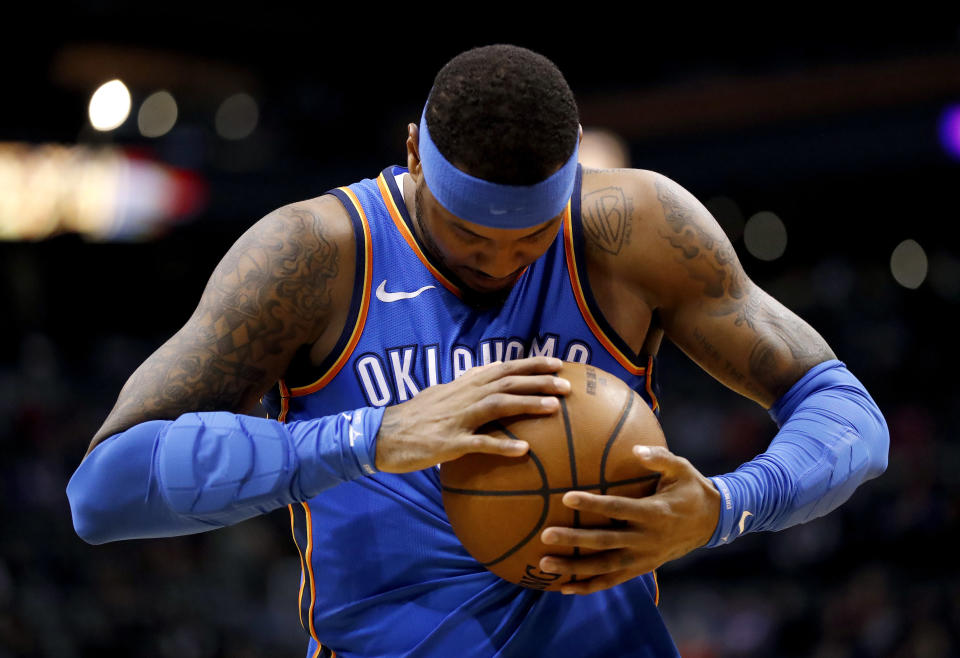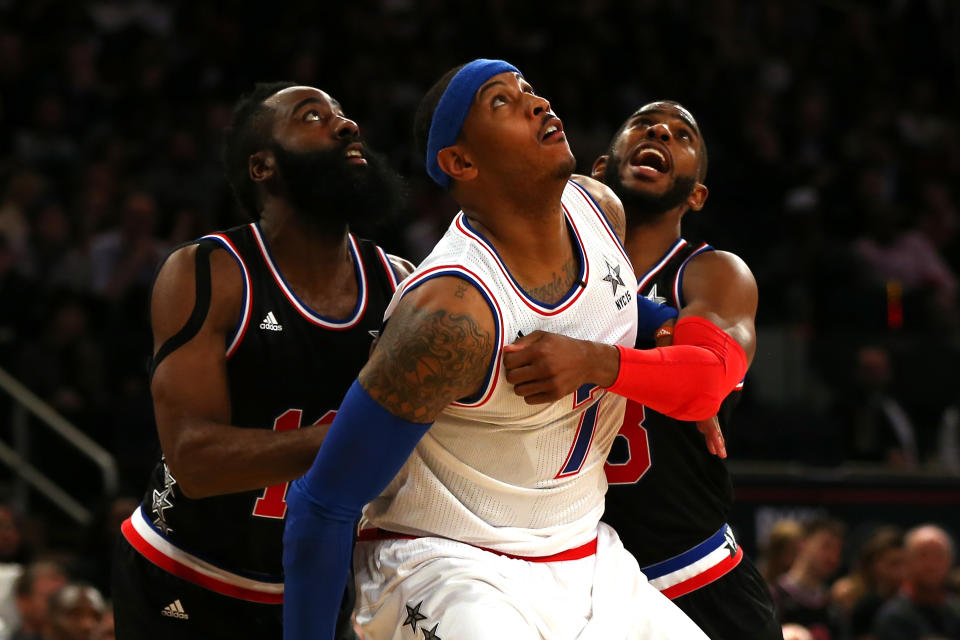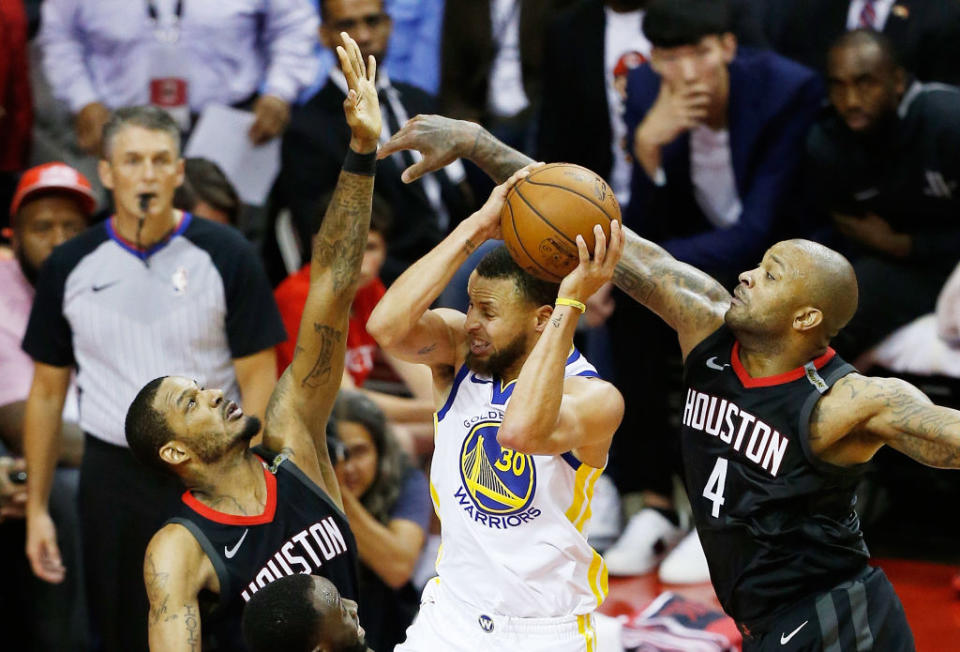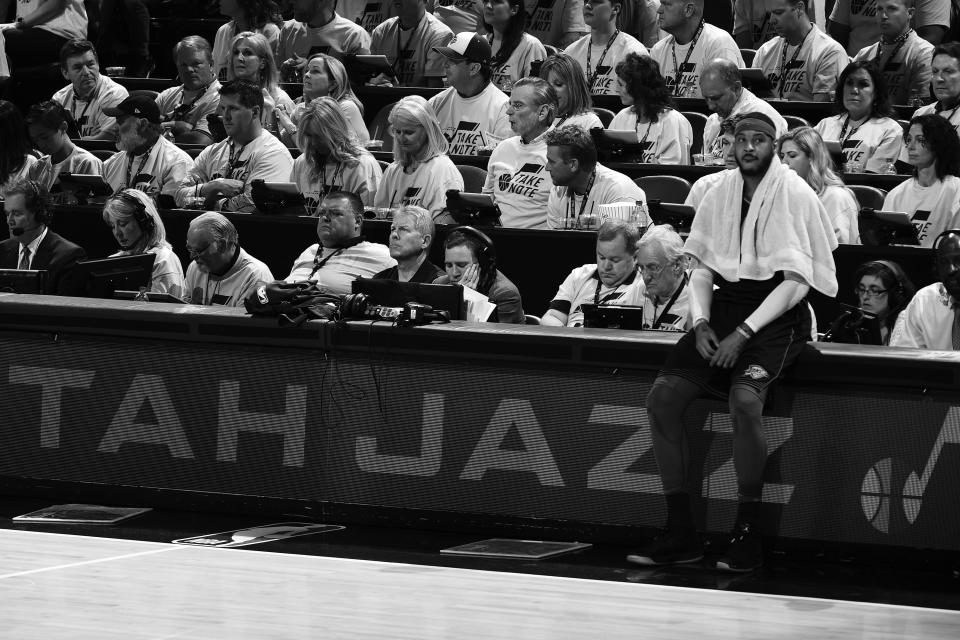Would signing Carmelo Anthony really make the Rockets better?

We don’t know yet exactly how it’ll end for Carmelo Anthony and the Oklahoma City Thunder; the possibilities include a trade, a waiver via the NBA collective bargaining agreement’s “stretch provision,” or a “combined buyout and stretch,” according to ESPN. But we do expect it to end, allowing Oklahoma City to shed Anthony’s $27.9 million salary (and slash what was poised to be a league-historic luxury tax bill by nine figures) and giving Anthony a chance to find a new home after an uncomfortable year in Oklahoma.
The most widely reported landing spot for the 10-time All-Star? The Houston Rockets, a team fresh off a 65-win season that ended one game short of the NBA Finals after giving the Golden State Warriors everything they could handle … and one that, after bidding farewell to 3,800 minutes of 3-and-D swingman, now has a glaring hole to fill at the forward spot.
Houston won’t be the only suitor for ‘Melo’s services. The Miami Heat will also be “a premium consideration for Anthony,” according to ESPN’s Adrian Wojnarowski. But pretty much everyone expects a deal to get done just as soon as Anthony’s reps and Oklahoma City’s brass find an acceptable method of tearing up the final year of his deal. (Which, by the way, might take a minute.)
That invites some questions. Namely …
Why do the Rockets want Carmelo Anthony?
Well, for one thing, because they’ve wanted him for a while. The dalliance goes back to at least 2014, when Houston wooed Anthony in unrestricted free agency before he returned to the Knicks for $124 million and a no-trade clause. The idea, as it has been in Houston for as long as Daryl Morey’s been running the show: do everything you can to get stars, then figure the rest out.
After things fell apart in New York amid an long-running war of words with Knicks president of basketball operations Phil Jackson, the Knicks once again changed course by firing Jackson. At that point, having won the power struggle, ‘Melo decided he was actually ready to waive his no-trade clause, provided the Knicks could steer him to either Cleveland, where he’d finally team up with buddy LeBron James, or Houston, where he’d run with newly acquired pal Chris Paul.
From the Rockets’ perspective, Anthony represented a third bankable scoring option, one who had just averaged 22.4 points in 34.3 minutes per game in his last season in New York. With two other All-Stars occupying attention, ‘Melo could roast opponents’ second- and third-best defenders and help ease the point-producing burden on Harden (who had just gassed out in a major way in the second round of the playoffs against San Antonio) and Paul.

And, like Paul, he’d add another dimension to Houston’s offense by virtue of being one of the best midrange scorers in the sport. Anthony posted the NBA’s seventh-highest shooting percentage among high-volume midrange shooters in 2016-17 — CP3 ranked first — which could help diversify a Houston attack that had torched defenses during the regular season, but struggled to generate good scoring chances in the playoffs against opponents who knew the Rockets were really only looking to shoot from three inches or 30 feet.
Playing as a small-ball power forward, as he had for years during his celebrated runs with the U.S. men’s national team, would theoretically allow Anthony to feast off the attention Harden and Paul drew. After all, he’d just ranked in the 94th percentile in points produced per possession as a spot-up shooter, according to Synergy Sports Technology’s game-charting data, and shot a higher percentage on catch-and-shoot 3s than Houston bomber Ryan Anderson had (albeit on fewer attempts).
In theory, Anthony could offer meaningful overall improvement on Anderson on the offensive end, replicating his floor-spacing effects while also providing more varied interior scoring and a credible threat of taking over a game by popping for 30-plus against even elite defenses. So his addition represented a worthwhile gamble for a team looking to “up [its] risk profile” in hopes of toppling the dynasty-in-the-making in Golden State.
The plan didn’t come together, though.
‘Melo going to OKC was a blessing in disguise for the Rockets
Despite Anthony’s willingness to waive his no-trade clause, he remained a Knick through the summer, as Cleveland dealt with its own trade-related mess and New York refused to take on the remaining $61.1 million owed to Anderson. Finally, with training camp looming, Anthony expanded the list of teams he’d be willing to join in trade and Sam Presti struck, pitching New York on a package of Enes Kanter, Doug McDermott and a 2018 second-round draft pick, and pitching Anthony on partnering with Russell Westbrook and Paul George to take a shot at the Warriors.
The Thunder wouldn’t get that far. Preseason energy and optimism fizzled amid a rough start to the year marked by an at-times awkward fit among Westbrook, George and Anthony — most notably, Anthony’s difficulty in adjusting to being a No. 3 option getting fewer minutes, touches and shots than ever.

There were plus sides to the experience. Anthony’s presence as a perimeter-anchoring stretch four did help open things up for Steven Adams, and the Thunder managed to work their way through all that awkwardness to 48 wins and the No. 4 seed in a tough Western Conference. On balance, Oklahoma City did perform better with Anthony on the floor than off it; the lineup of Anthony, Westbrook, George, Adams and Andre Roberson blitzed opponents by 12.5 points per 100 possessions, the seventh-best net rating in the whole league among groups that logged 200 minutes.
But for every step forward, the Thunder seemed to take two steps back, never finding a comfortable rhythm that would allow the team to become more than the sum of its parts. And Anthony’s shortcomings, especially on the defensive end, cost the Thunder dearly against top-flight opponents. He looked like a shell of his former self during Oklahoma City’s first-round playoff loss to the Utah Jazz, averaging 11.8 points in 32.3 minutes per game on 37.5 percent shooting in a six-game defeat.
The Rockets, meanwhile, rebounded brilliantly from missing out on Anthony.

On offense, they relied on Harden, Paul and Eric Gordon to create mismatches and scoring chances in a supercharged iso-ball offense that bore little resemblance to head coach Mike D’Antoni’s “Seven Seconds or Less” past. They divided their wing minutes among Ariza, P.J. Tucker and Luc Mbah a Moute: tough, smart defense-first types perfectly comfortable spacing the floor from the corners without demanding a star’s share of the offense. With a roster bookended by excellent defenders in CP3 and center Clint Capela, a stout and strong two-guard in Harden, and versatile, long swingmen in between, Houston set about developing an aggressive, switch-everything defensive scheme under the direction of assistant coach Jeff Bzdelik, aiming to eventually grind the Warriors’ fast-moving offense to a halt.
The result: the NBA’s best record, No. 2 offense and No. 6 defense, and a trip to the Western Conference finals that ended in a seven-game defeat by the Warriors after losing Paul to a hamstring injury in Game 5, holding double-digit leads in both Games 6 and 7, and missing a historic 27 straight 3-pointers in Game 7. So, y’know: pretty good run.
So how would Carmelo fit on these Rockets now?
With Ariza and Mbah a Moute gone, the Rockets need someone to come in and take significant forward minutes. Given Anthony’s relationship with Paul, Houston’s prior interest in him and the opportunity to step into a role on a contender, the rumblings connecting player and team make sense. At issue, though, is whether he’d fit any better in a tertiary role as a Rocket than he did in Oklahoma City.
As he had before the season and early in it, Anthony made it crystal clear after the Thunder’s elimination that he believed the problem with his time in Oklahoma was less his play than the role he was given, and that any further reduction in that role was simply out of the question:
“I’m not sacrificing [by playing] no bench role,” Anthony said of next season. “That’s out the question.” […]
“I don’t think I can be effective as [a catch-and-shoot, limited-touches] type of player,” Anthony said. “I think I was willing to accept that challenge in that role, but I think I bring a little bit more to the game as far as being more knowledgeable and what I still can do as a basketball player.” […]
“I think everybody knows that I’ve sacrificed kind of damn near everything — family, moving here by myself, sacrificed my game for the sake of the team, and was willing to sacrifice anything and everything in order for this situation to work out,” Anthony said. “So it’s something I really have to think about, if I really want to be this type of player, finish out my career as this type of player, knowing that I have so much left in the tank and I bring so much to the game of basketball.”
It’s not surprising that a player with Anthony’s résumé would feel that way. It’s just not necessarily supported by the facts of the case at this point.

The step ‘Melo has lost matters most to a team like Houston
By the end of the series against Utah, Anthony was nigh-on unplayable, bricking 22 of his 28 3-point shots while getting repeatedly targeted and roasted by rookie scorer Donovan Mitchell in the pick-and-roll. The Thunder were better without him on the floor in the postseason, and by no small margin:
Carmelo Anthony on-court vs. the Jazz: 194 minutes, -58
The Thunder with Carmelo Anthony off-court vs. the Jazz: 94 minutes, +32— Rodger Sherman (@rodger_sherman) April 28, 2018
The Rockets, meanwhile, stifled the Warriors into an isolation identity crisis through the first few games of the conference finals because they could switch everything without leaving gaping holes for Golden State to exploit with ball and player movement. When the Cavs tried to adopt the same strategy on the fly in the Finals, only with personnel ill-suited to the task, they got destroyed.
Ask Anthony to handle that kind of defensive assignment on the wing — at age 34, with 15 years and nearly 41,000 minutes on his professional odometer — and it’s tough to imagine his performance tending more toward Ariza/Tucker than it does toward Kevin Love. Which seems like a death knell for Houston’s chances of pushing the Warriors as hard as last year.
Maybe the Rockets could survive that if Anthony lifted them up to an even higher stratosphere on offense. But there, again, there are reasons to be skeptical.
Whereas two years ago Anthony offered an efficient catch-and-shoot 3-point option, last year’s model ranked 36th in effective field goal percentage among 47 players to take at least four such shots per game. He dropped from the 94th percentile in spot-up-shooting efficiency to the 59th, rocking the same eFG% as Lonzo Ball.
A Rockets team whose offense veered historically and almost comically into isolation territory last season would seem like a snug fit for Anthony, long one of the game’s great practitioners of the dark art of the jab-step isolation pull-up jumper. But Houston ran that offense specifically for Harden and Paul because they were, literally, the two best players in the world to do it. Anthony last season ranked 24th out of 47 players to log 100 isolation possessions, averaging the same number of points-per-iso as James Johnson and Rondae Hollis-Jefferson; if the ball sticks in Houston, you’d wager they prefer it not stick with him.
Given that, after very publicly bristling at a reduced role in which he used a lower-than-ever share of his team’s offensive possessions (23.2 percent, down from 30.9 for his career), how willing is he going to be to accept what could be an even more circumscribed offensive role along the lines of what Ariza (14.4 percent usage rate last year) and Mbah a Moute (12.9 percent) are leaving behind on a team led by two of last season’s nine most ball-dominant players in terms of total and per-touch time of possession?
How will ‘Melo and Mike D’Antoni work together this time?
Taking another tightly bound role mere months after expressing absolutely no interest in doing so would seem to require Anthony to make peace with quite a few things about where he’s at in his career. Doing it in Houston would also seem to require Anthony to very literally make peace with D’Antoni, who was the Knicks’ head coach when Anthony made his way to New York in 2011 … and who then wasn’t the head coach a year later.
That D’Antoni didn’t make it to the end of 2012 in Manhattan seemed due at the time to a clash with ‘Melo. After initial caginess about leaving because “an obstacle had to be removed” and because he never should have left Phoenix, D’Antoni has since straight-up said that he left because Anthony went to Knicks management and said they needed to choose between player and coach, which made D’Antoni decide to quit.
Now, Anthony’s the star on the back nine of his career, and D’Antoni is the resurgent offensive visionary with the rehabilitated reputation who’s already got buy-in from Harden and Paul. Maybe time heals all wounds, and the chance to win the title that has eluded them both overrides everything else enough to get everyone on the same page; for what it’s worth, Woj reported Tuesday that, during a meeting with Anthony and his reps, “D’Antoni made it clear to Anthony that he thinks the circumstances together would be far different in Houston, and welcomed the idea of coaching Anthony again.” Still, that dynamic, like just about everything else in this situation, will bear watching.
It feels like the risk outweighs the reward on ‘Melo-to-Houston
Maybe the Rockets believe a defensive spine still featuring Paul at the tip of the spear, Capela at the back line (provided nothing gets extremely weird in his still-ongoing restricted free agency) and the malleabe and mauling Tucker riding herd can help cover up ‘Melo’s blemishes. Maybe they believe that the playmaking tandem of Harden and Paul can wring maximum efficiency out of Anthony’s touches by creating cleaner looks in bigger windows, and that we’ll see Olympic ‘Melo far more in Houston than we did in OKC.
Maybe the ever-industrious Morey believes he can find a younger, cheaper 3-and-D fit elsewhere — like in the G-League, or overseas. Or maybe he prefers to keep what remains of his powder (read: the taxpayer midlevel exception of $5.3 million) dry into the season, potentially allowing Houston to be players for other established talents who might find themselves on the market for one reason or another.
“We feel confident,” Morey told ESPN’s Tim MacMahon. “We need our best team on April 15. We’re going to either sign or trade or something to get us back to where we need to be, and we also really like our group.”
Confidence can be a great thing; this decision, though, might skew more toward hubris.
It was tough to see the latter-day Carmelo Anthony being the piece that could get the Rockets where they needed to be this time last year. After what we saw unfold this season in both Oklahoma City and Houston, it seems unfathomable. ‘Melo is one of the great players of his generation, a pure scorer who’ll waltz into the Hall of Fame the second he’s eligible, but he’s not the guy the Rockets need to keep pace with the Warriors. It’s admirable that the Rockets remain willing to take big swings in pursuit of an elusive championship, but this time, the risk-reward calculus sure seems to be tilted the wrong way for Houston’s title hopes.
– – – – – – –
Dan Devine is a writer and editor for Yahoo Sports. Have a tip? Email him at devine@yahoosports.com or follow him on Twitter!
More from Yahoo Sports:
• LiAngelo Ball will play in his dad’s league after all
• Why isn’t the U.S. better at soccer? It’s all about $$$
• Massive bee invasion delays Texas minor league game
• Kawhi Leonard and the Spurs have the entire NBA waiting

